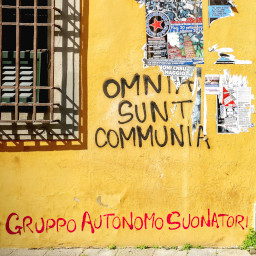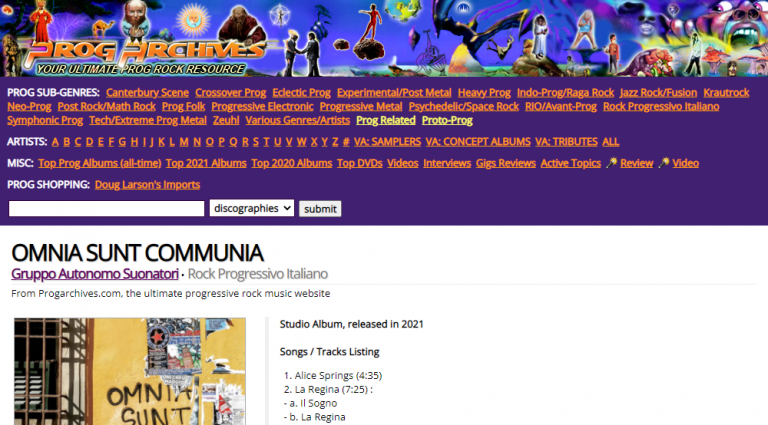Articolo originale su Prog Archives – by Matti

Although GRUPPO AUTONOMO SUONATORI — or G.A.S. — has existed well over two decades by now, no sooner than last summer they released their debut album via Black Widow. And a very fine RPI album it is. The musicianship is excellent and so is the production.
Stylistically the band could be taken as a prime example of the very faithful contemporary representation of the classic Italian prog. Definitely they are not alone in this matter, for one could say at least 70 percent of the vintage-style Rock Progressivo Italiano has been recorded in this Millennium. The worn-out phrase “sounds like straight from the seventies” has, in a way, lost its meaning; if it was to be taken literally, the production of a new album would be quite poor by modern standards and it surely would exclude this work. But yes, I’m saying that judged by the music alone this album stands perfectly amidst the whole legacy of RPI. Now I hear you asking why I’m not rating this with five stars. First off, I’m not a person who gives the biggest album classics automatically the full rating. Nor am I among those prog listeners who blame new acts of sounding retro and aping the seventies. Before getting into the more detailed analysis of this album and concentrating on all that’s great, I can put in a nutshell the factors preventing me to raise this album subjectively to the masterpiece category. The vocals of the songwriting frontman Claudio Barone (who also plays bass, bouzouki and mandolin) are not up to my taste — in fact this is the case with the majority of all-time RPI, sad to say. His rough-edged voice comes quite close to Mark Trueack of UNITOPIA, or in general many vocalists of hard-edged RPI bands. On a couple of tracks he pushes his voice out rather aggressively. And as strong as this album is for sure, in the end it doesn’t really MOVE me emotionally as a whole, only here and there.
The good thing is that this 50-minute album is roughly half instrumental. The opening track ‘Alice Spring‘ (does it have something to do with the Australian location called Alice Springs?) features a lot of saxophone and organ in the vein of Van der Graaf Generator, and a powerful melodic main phrase. ‘Regina‘ is a two-part composition, starting with a romantic, piano-centred, slightly Wakemanesque instrumental part. The sung part is very nice too as it features xylophone, flute and PFM-like synths. Next, two ‘Preludio‘-instrumentals. No. 1 is a charming little folk- rock piece starring bouzouki, mandolin and Irish flute. The Old Music (Medieval/Renaissance) flavour sounds very authentic in this piece written by Barone. No. 2 is rooted on acoustic guitar and synths. A bit like STEVE HACKETT at his most romantic.
‘Il Sacco di Bisanzio‘ is the most vocal-oriented and clearly my least favourite track here. However it does have cool sonic details, and as an instrumental I’d like it much more. The three-part ‘Beatrice‘ (9:16) has folky nuances quite the same way as the early PFM. Barone as a vocalist is more sensual on this dynamic and passionate track. ‘Il Richiamo della Sirena’ is the only track not composed by Claudio Barone: drummer Valter Bono and synths player Thomas Cozzani offer a lively, fusion-y instrumental. The delicate mid-section is perhaps the album’s most modern- sounding moment. The title track (9:17) is an impressive finale to the album, starting with a cinematic, narrated intro. This is the other track in which vocals are too pushed, but I love the magical flute riffs, the majestic organ part and even the Gregorian flavoured repetition of “Omnia sunt communia“. If you want to get just one album of Rock Progressivo Italiano from 2021, this is my strongest recommendation this far. A masterful combination of vintage semi-heavy prog, classical and folk elements. 4½ stars, rounded down mainly because of the less enjoyable vocals.









